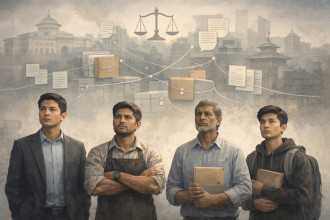
Politics has always taken precedence in Nepal over any other aspect whether economic, development, civil or diplomacy. Sadly, however national politics is confined to party rivalries, promotion of vested interests, and playing up of internal hostilities and differences. While the focus should have been on good governance and mitigating the challenges of the Covid 19 pandemic, leadership has repeatedly failed its citizens.
It can’t be entirely said that the government has not delivered on development priorities in the country, yet lack of pace, intention and quality cannot be ignored. It is also relevant here that the leading political parties of the country are consistently moving further apart in their political values and approaches to the issues facing the country. This has led to a weakening economy, heightened corruption, lack of opportunities for the young demographic of the country, and flailing international relations.
Any government is built to deliver results in the public interest and to foster policy innovation; instead, most rules have been perversely optimised to favour a few. Instead of the political system building itself as a public institution constructed on impartial structures and practices derived from the constitution, its dysfunctions have perpetuated a culture of exploitation and social harm.
Will the political system correct itself? Not until politicians and the public that votes understand that the forces that determine elections and legislation must reflect public interest foremost, that accountability and transparency in government is a prerequisite to good leadership, that economic competitiveness and social progress are markers of good government, that innovation in politics needs to be more powerful and achievable and this can happen only when new entrants into politics are given a fair playing field, that policies must be coherent and sound, and that the public must refuse to accept a failed political system as its fate.
Further businesses in the country must realign how they engage with political parties and government. It is no secret that most business contributions to political parties are made to secure influence and favour. It is time we debate in public what business engagement in politics looks like? What is its impact and how does it serve a business person or organisation’s interests and values, and what then is the impact on the common man?
READ ALSO:
Published Date: February 18, 2022, 12:00 am
Post Comment
E-Magazine
RELATED Editorial Page





-1763289082.png)